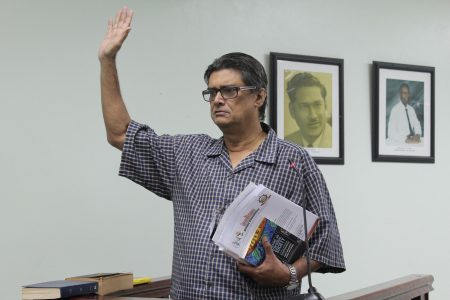‘Our responsibility is not to take lands away from anyone’
-land inquiry commissioners.

Evan Persaud being sworn in before the Commission of Inquiry established to investigate ancestral land matters. (Commission of Inquiry photo)
October 4,2017 Source
Members of the Commission of Inquiry (CoI) into African ancestral land matters, yesterday made it explicitly clear that their mandate does not include dispossessing anyone of their land.
Commissioners Lennox Caleb and Paulette Henry were addressing a concern raised by witness Evan Persaud, who appeared on behalf of the Indian Action Committee (IAC), formerly known as the Indian Arrival Committee.
Persaud, a University of Guyana Lecturer, is also a founding executive member of the body.
His concern came just on the heel of a letter sent by attorney Anil Nandlall, who is representing 150 families who are fearful that they will lose their land as a result of claims made at the CoI.
Persaud had related that “given Guyana’s turbulent political history” it is the fear of some that they will be removed from the land they occupy.
“The IAC is opposed to the idea that in the present circumstances of Guyana, that land could be taken away from one set of people to be given to another,” Persaud stated.
Persaud had opined that problems began with African communal villages where land was held jointly, thus creating problems with individual land titling. He noted that since then, persons of other ethnicities have since occupied these villages.
Asked by Caleb to explain what he meant by land being taken away from one group and distributed to another, Persaud said, “There are many people…especially of Indo-Guyanese origin, who have lands, whether they are free-hold lands or lease hold lands…many of them are very concerned, given the turbulent history of Guyana, that they may be, for some reason, thrown off these lands arbitrarily…it might be called irrational…but many people are thinking, you know—especially in the given hour of, as I said, turbulent political history and polarisation, especially between the two main ethnic groups.”
Caleb pointed out that the terms of reference of the CoI are specific in the matters the commission is examining and said that what Persaud highlighted does not fall within that ambit. He further stated that he does not recollect anyone who came before the commission making such a case.
“Perhaps we should be governed by what the public record on the Commission of Inquiry says,” Caleb advised.
His statement was supported by Commissioner Henry.
“I just wanted to add that we had some major organisations representing African interests who have come to the fore—and some individuals—and they have all indicated, based on my own understanding of the presentations, that they want a settlement that is going to make Guyana a more coherent society rather than a disruptive one,” Henry added.
“I do recall, particularly in the case of Kingelly, where, when asked, the person who was presenting at that time indicated that if people are living there they don’t want to disrupt those people, but what they would want to see is to have the occupation of those lands that are not in use and to find other ways of settling,” she added.
Henry said that the commission’s concern is to seek redress for persons who have been dispossessed of lands while either being in occupation of it or bearing title to it, as has been heard in many witness accounts.
She noted that they can only make recommendations on the way forward.
“We just want to put it very clearly that our responsibility is not to take lands away from anyone. As Guyanese I think we all have—you and I and us— we all have a responsibility to ensure that whatever we’re doing is in the best interest of people and country,” Henry stated.
Nandlall wrote to the CoI on behalf of 150 families that were said to be opposing evidence brought before the commission related to the ownership of land at Kingelly.
Trade unionist Lincoln Lewis, on August 29, presented the transport for the village, which he stated was dated 1850, to the CoI. He had also told the commission that his great-great-grandfather, Kojo McPherson, had also bought the village of Lichfield, West Coast Berbice in 1840, but said that squatting was only an issue in Kingelly. Lewis asked the CoI for assistance in peacefully reclaiming the remaining unoccupied land.
Nandlall’s letter requested three weeks to submit a statement to allow his clients to testify, as he claimed some of them had titles to the land and their families had been in possession of the properties for over 200 years.
The CoI’s mandate is to examine and make recommendations to resolve all the issues and uncertainties surrounding the individual joint or communal ownership of land acquired by freed Africans and other matters relative to land titling.
It is being chaired by Reverend George Chuck-a-Sang, with Caleb, Henry, David James, Professor Rudolph James, Berlinda Persaud, and Carol Khan-James serving as commissioners.
